|
|
|
Owen: You have started your own production company Tempe Entertainment (www.tempevideo.com); do you have a mission statement or company focus? J.R.: Tempe has been around since late 1988. Toward the tail end of post-production on THE DEAD NEXT DOOR, I decided to scrap my Amsco Studios name and go with The Suburban Tempe Company, and in 1991 Tempe Video branched off from that. When I moved to Los Angeles in 1997, I decided "Tempe Entertainment" had a better ring to it so that has stuck ever since. My mission statement is a simple one...when I have an idea I think is cool and want to make a movie, I do. When I see a movie I think other people need to see, I acquire it. It's really not more difficult than that. (Laughs) Owen: What did you learn in your extended time with production companies, Full Moon Pictures and Cinema Home Video that you either wanted to incorporate or correct with your own company? J.R.: Mostly I just learned what not to do! (Laughs) But the real-world experience from those companies was invaluable. The Cinema Home Video experience showed me that it was possible for an average Joe to start his own distribution company, and it helped me keep going making new movies at a time when I needed to do that. But mostly it taught me some bad habits in the long run. The same applies for Full Moon, although it was financially rewarding for sure. In Charlie Band's case it was amazing to watch this guy who's been in the business since the early '70s make the same really obvious mistakes over and over again and never learn from them! The guy has more lives than a cat is all I can say. (Laughs) Owen: So what is the first order of business, the plan of action for Tempe? J.R.: Unlike what
they teach you in business school, I'm not out to
Owen: You began your directing career at 19 when you started filming 'The Dead Next Door' in the mid 80s, which was partially financed by none other than Sam Raimi ('Evil Dead', 'Spiderman'). How did that come about and what do you think he saw in you? J.R.: Basically it was one of those total strokes of luck that happen once in a lifetime. Right out of high school I attended the Art Institute of Pittsburgh, and at the beginning of my second year there my apartment was robbed. So I decided that was a sign from God, packed it in and moved back home with my mother. I'm sitting around feeling dejected, flipping through back issues of FANGORIA magazine and I come across the cover story on THE EVIL DEAD. This was a movie that I saw over and over again as a teenager, to the point where I could almost recite the script by memory even today. (Laughs) I had been reading that they were trying to get an EVIL DEAD 2 off the ground, so I figured I'd try my luck getting a job on it as a production assistant since I was in Akron and they were only 4 hours away in Detroit. Long story short, I wound up going up there to meet the Renaissance gang, never expecting that a job interview would turn into my first feature! I think it was probably a Midwest thing, similar upbringing in a similar region...who knows. (Laughs) Owen: I've read that Raimi's frequent star, Bruce Campbell, even helped with the sound editing for 'The House Next Door'. But more importantly, I want to hear about Bruce teaching you to drive a stick-shift! J.R.: Yeah, Bruce got involved at the very end. We had finished all the picture work and the movie was again languishing. I happened to come out to L.A. with a friend just to kick around for 2 weeks, and made one of those fateful phone calls that wound up being the one that got the movie completed. Bruce was brought in because he had been the post-production supervisor on the Renaissance flicks up to that point...I guess he knew more about post than anyone else there. He basically built all of the foley and did a lot of the ADR work, including the characters of Raimi and Commander Carpenter. It was quite a kick to work with the star of EVIL DEAD on my first movie! It's true, Bruce Campbell taught me to drive a manual transmission car! The place where the movie was being mixed was in Hollywood and for some reason, Bruce was going to be there awhile and I had to get back to the Van Nuys area over the hill...probably because I was scoring the movie as the sound was being built. I didn't have a car so Bruce suggested that I drive his little beater and he would find a ride to come and pick it up. The problem was, I didn't know how to drive stick shift then! So Bruce gives me this crash-course on the streets of Hollywood and then sends me out to the wolves on the 170 freeway during 5 o'clock traffic! I was grinding gears and stalling out like you wouldn't believe. (Laughs) But I got back to where I was staying OK and it's a pretty funny story looking back on it now. Owen: While you were enrolled at The Art Institute of Pittsburgh you had the honor of being an extra in the classic 'Day of the Dead'. Tell me about that experience? J.R.: One of my motivations in picking AIP was of course because Romero was still based in Pittsburgh and I secretly hoped I could find some grunt work on one of his flicks. Halfway through my first year they were in production on DAY OF THE DEAD...I used to go over to Tom Savini's house and just hang out, watching them come up with some of the early stuff like that Dr. Tongue puppet that graces the main titles. My school schedule was 4 hours each weekday in the afternoon, so there was no way I was going to be able to get a job on the movie and still go to school. I had someone from the employment agency at AIP call the production office to see what could be done, and they suggested I come out to be a zombie extra. So my roommate and I schlepped out to Beaver Falls and wound up in the scene where Steele is being pursued by Bub, gets bit and winds up committing suicide. If you look closely (maybe with slo-mo on the DVD) you can see me in a few shots, I'm the zombie in the red jacket with half of the left sleeve missing. It was mostly a lot of waiting around, but at the end of the night I got to take a great pic with Romero. It was a great experience, because I learned about wrangling extras and the following year I'd put that experience to use making THE DEAD NEXT DOOR. Owen: When you came to LA you worked doing a great deal of post-production work with Full Moon as well as other studios working on such movies as 'Shrieker', 'The Brotherhood', 'Talisman', 'Curse of the Puppet Master', etc. What are the best parts about being an editor, what did you enjoy about the work? J.R.: I always had an interest in post-production, mainly because it's the phase where everything comes together. Most filmmakers live to be on the set directing, but honestly I would rather be locked in a dark room with the footage, putting it all together! So when I decided to relocate to L.A. in early 1997, I didn't really have a plan except to get out of Ohio and try something new. About 6 months went by and I was doing some freelance graphic design and website work at the same time I was helping some friends post their movie SLEEPWALKER. A director I had made some flicks for in the past happened to see all of this going on in my living room and I guess it gave him an idea. Next thing I know, he sits down to offer me the editing and sound mixing on SHRIEKER, which he was about to make for Full Moon. I had never cut a 35mm show before — even though I was using my same Adobe Premiere system on a Power Mac that I had used for my shot-on-video flicks, they wanted to cut the negative so that was a new challenge. I also bought a basic Pro Tools system and learned it in time to mix that show. It was all very seat-of-your-pants and low budget, but for me it was a big step up. That gig got me the same one on CURSE OF THE PUPPET MASTER, which led to a slew of post work for Full Moon and finally to me being hired as their post-production supervisor. In short order I was manning a team of 20 people, but by the summer of 1999 I was really not interested in doing that anymore. I wasn't doing creative work; I was just scheduling and supervising. Thankfully around that time, Full Moon decided they couldn't afford to keep an in-house post team, so we went back to doing everything freelance. After a few months, I got hired to direct WITCHOUSE 2: BLOOD COVEN for them and that led to producing a string of other flicks, where I was responsible for literally everything from script development to laying out the final DVD! Owen: You have also done a great amount of producing, most notoriously producing William Shatner's directorial feature 'Groom Lake' (2001). What was the primary source of all the problems and friction with the production? J.R.: You know, I really, truly hate producing but if you look at my IMdB page, I've now done more of that than anything else! (Laughs) GROOM LAKE fell into my lap as part of a series of DVCAM features that I produced for Full Moon after directing WITCHOUSE 2. It was the biggest of the four movies that were being made back-to-back between August and December 2000. There were several problems with GROOM LAKE. The first was that Charlie Band was lying to Shatner about the money we were going to spend. He told him this was a $500,000 movie and then would turn around to me and expect it to get made for $250,000. The script was way too big for either of those budgets, and Shatner was told this all along but he wouldn't budge, and in fact he wound up making it more complex as time went on! But the main problem is that Shatner was not used to our hit-and-run style of filmmaking...this guy directed STAR TREK V with a fleet of producers and assistant directors, for God's sake. He didn't like to be told "No" and I was the guy that had to keep doing that to him. So we had some pretty gnarly spats, but I treated him just like any other director that I've produced for...I wasn't intimidated by him at all. Sadly the budget problems and Shatner's inexperience just collided into the big fat train wreck you see on video store shelves today. (Laughs)
J.R.: Well, I have an interesting perspective on the DV revolution. I made my first video feature in 1991 on Super-VHS, at a time when everyone said we were crazy to even attempt such a thing! And to be honest, the technology was not up to par then. But I kept at it and something like OZONE showed people that it was really possible to make something cool with no money and a camcorder. By the time we shot POLYMORPH in 1996, Sony had just shipped their first VX-1000 and we got our hands on one. I'm fairly certain we were the first guys to shoot a feature on Mini-DV. But really what separates me from most of the DV guys is that I've shot on all kinds of formats...Super-8mm film, 16mm, Super-VHS, Mini-DV, 35mm, DVCAM and more recently HDCAM 24p for DEADLY STINGERS. Most guys don't have that depth of experience. I mean I'm thankful to have done all this at a time when we cut some of our early shows on 16mm film, on a bench, and now can translate that experience to Final Cut Pro. Cutting old-school style on film teaches you a certain discipline, and I think you can then apply that to digital editing and do a better job than the guy who runs home from the Apple Store having never cut anything in their life and installs Final Cut Pro. (Laughs) Really the best advice I can give is, shoot your movie like it's a movie! Light it and compose your shots cinema-style. Get the mic off the camera and boom your actors like the pros do it. These are simple things, but you'd be amazed how many people can't seem to grasp these basic concepts. And for God's sake, stop shooting raw video and trying to fool everyone with film look...24p has eliminated that completely! Owen: Tell me about Tempe's 'Bad Movie Police' series. J.R.: BAD MOVIE POLICE started as an in-joke amongst my friends years ago. Every time I heard a siren wailing in the distance, I'd joke that "the Bad Movie Police are coming to get me" and it would always get a laugh. Then I started thinking; what if there really were a Bad Movie Police? What if they went after bad filmmakers for acts of "cine-terrorism" and then presented the offending movie to the public? Of course, thankfully I had the perfect movies to use for this vehicle and those were 5 or 6 video features that I had made for hire back in 1991-1992. After a false start or two, we shot the first 3 segments in early 2003 and the first 2 were released that fall. The initial sales were OK, not spectacular...sadly I spent far too much money shooting the 3 wraparound segments only to have the concept weighed down by these dreadful movies. But the people who saw them, dug them, and the reviews were great...most of them were way too kind to the movies as a result of the approach we had taken! (Laughs) So I have 2 more movies to do this treatment to eventually, and a lifetime of ideas to tap into. Owen.: Are series favorites Lilith Stabs (as Lt. Drucilla Dread) and Ariauna Albright (as Sgt. Elke Mantooth) as much fun as they seem? J.R.: Absolutely!
It's kind of funny because most people know that Owen: So when you look back on your youth do you see instances that make you nod and say, "Yep, that kid was destined to grow up to be in horror biz." J.R.: I'm sure my parents do! I mean, my bedroom was lined with horror movie posters and what-not, I always had my head in an issue of FANGORIA or Famous Monsters or whatever. I took my first stab at making home movies at age 10 or 11, and I just kept on doing it right through high school and college, up until THE DEAD NEXT DOOR. I don't think there was ever a doubt in my mind that this was what I'd wind up doing. (Laughs) Owen: What projects do you have lined up in the near future? J.R.: I'd like to finish out the BAD MOVIE POLICE series, and maybe even take the idea one step further with something called THE BAD MOVIE POLICE MOVIE...sort of like an AMAZON WOMEN ON THE MOON-style comedy. The current interest in zombie movies has resurrected interest in my DEAD FUTURE: THE DEAD NEXT DOOR sequel, but that's been round and round so many times by now I don't hold out too much hope that it will ever be made. I've been taking a long break from production for the last couple of years, mostly to cleanse myself of some bad habits I picked up from working with folks like Full Moon and also to concentrate on the DVD business. So I'm not entirely sure when I'll step behind the camera again... Owen: What scares you in real life? J.R.: Sharks still get me, every time. I thought the last half of OPEN WATER was just as effective as JAWS! My two biggest fears are probably being broke and dying alone, though. (Laughs) |
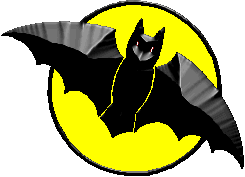







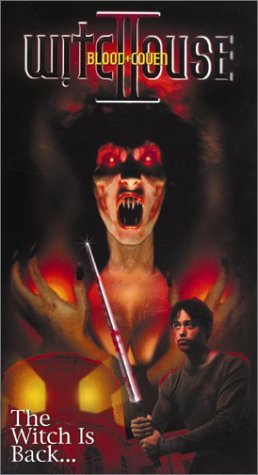
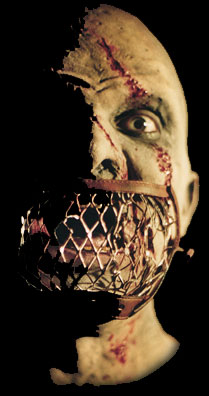 dominate
or be a conglomerate. I'm perfectly happy running
this as a small boutique operation, occasionally
making some small movies that I'd like to do. If
anything, my main goal is just to introduce
people to some different stuff...we have a very
eclectic lineup of product, with extreme comedy
from Chris Seaver (MULVA: ZOMBIE ASS
KICKER!, FILTHY McNASTIEST),
experimental short films from Jason Santo (BENT),
gritty drama/comedy from Jeff Burr (EDDIE
PRESLEY) and some gutsy horror from guys
like Scott Phillips (THE STINK OF FLESH).
It's a bit more variety than most distributors, I
think.
dominate
or be a conglomerate. I'm perfectly happy running
this as a small boutique operation, occasionally
making some small movies that I'd like to do. If
anything, my main goal is just to introduce
people to some different stuff...we have a very
eclectic lineup of product, with extreme comedy
from Chris Seaver (MULVA: ZOMBIE ASS
KICKER!, FILTHY McNASTIEST),
experimental short films from Jason Santo (BENT),
gritty drama/comedy from Jeff Burr (EDDIE
PRESLEY) and some gutsy horror from guys
like Scott Phillips (THE STINK OF FLESH).
It's a bit more variety than most distributors, I
think.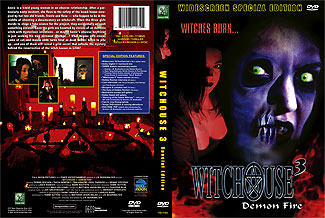
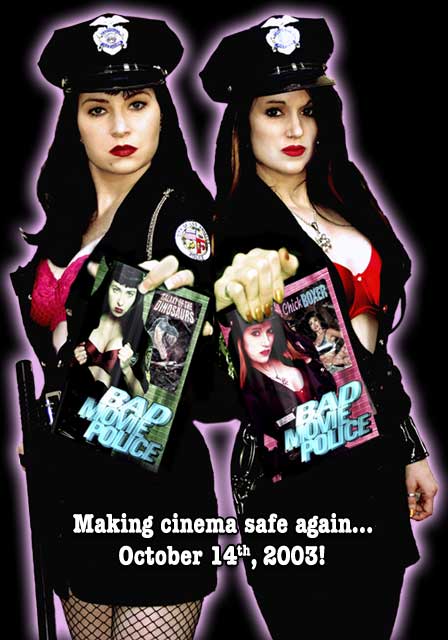 Ariauna
and I dated briefly before we ever made movies
together, and at the time we shot BAD
MOVIE POLICE I was dating Lilith.
(Laughs) So I think everyone kept waiting for the
claws to come out, but it couldn't be farther
from the truth. Those two had a blast together
and they bug me all the time to shoot new
episodes. The original concept only had Ariauna
by herself, but I'm glad that I expanded it to be
two gals, because they play off each other very
well. Lilith's background as a dominatrix
certainly lends itself to playing Drucilla Dread,
whereas Ariauna was playing it a little more
hard-boiled. I had a good time making those
episodes with them...my only regret was that I
decided to produce instead of direct, but
probably for the next two I'll remedy that so I
can get in on the fun a bit more.
Ariauna
and I dated briefly before we ever made movies
together, and at the time we shot BAD
MOVIE POLICE I was dating Lilith.
(Laughs) So I think everyone kept waiting for the
claws to come out, but it couldn't be farther
from the truth. Those two had a blast together
and they bug me all the time to shoot new
episodes. The original concept only had Ariauna
by herself, but I'm glad that I expanded it to be
two gals, because they play off each other very
well. Lilith's background as a dominatrix
certainly lends itself to playing Drucilla Dread,
whereas Ariauna was playing it a little more
hard-boiled. I had a good time making those
episodes with them...my only regret was that I
decided to produce instead of direct, but
probably for the next two I'll remedy that so I
can get in on the fun a bit more.